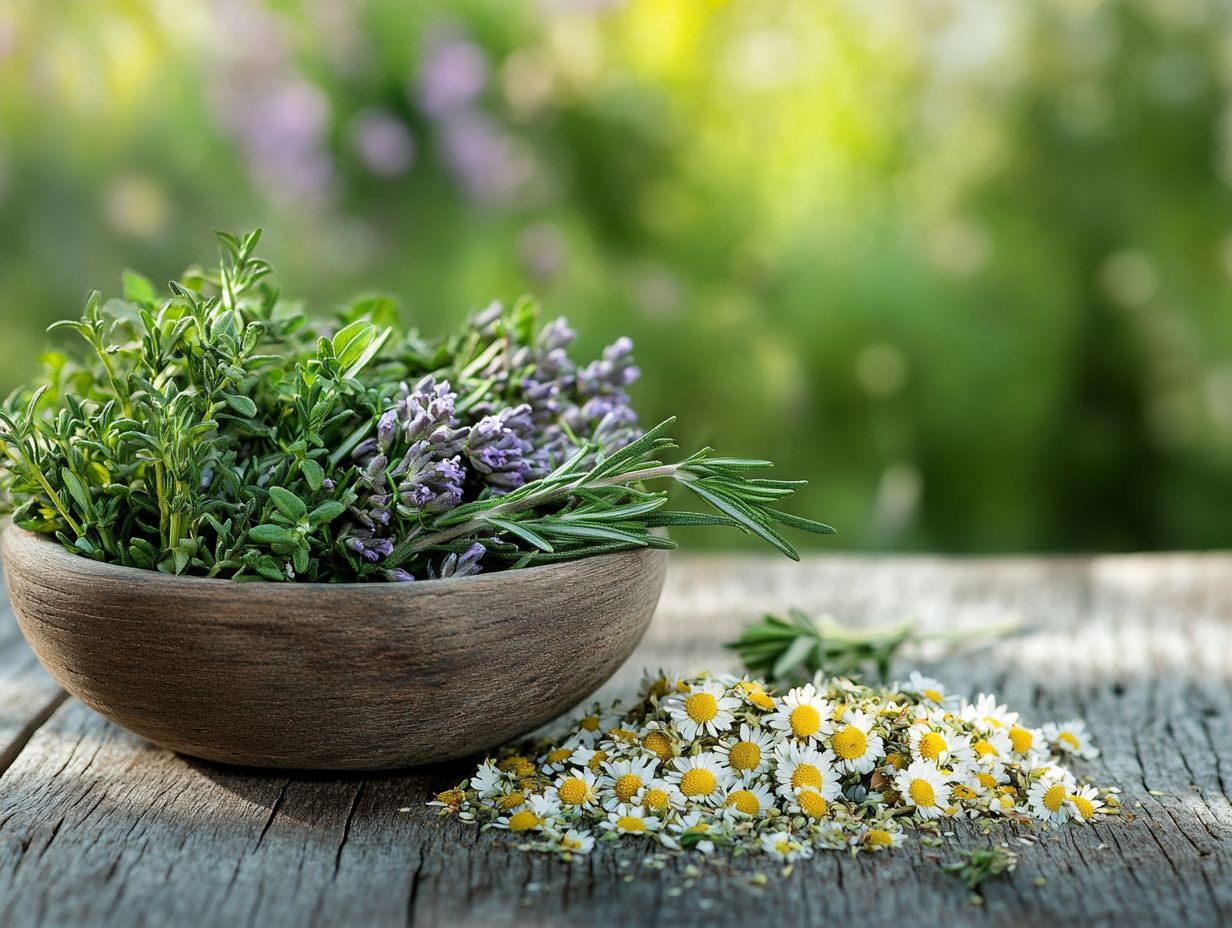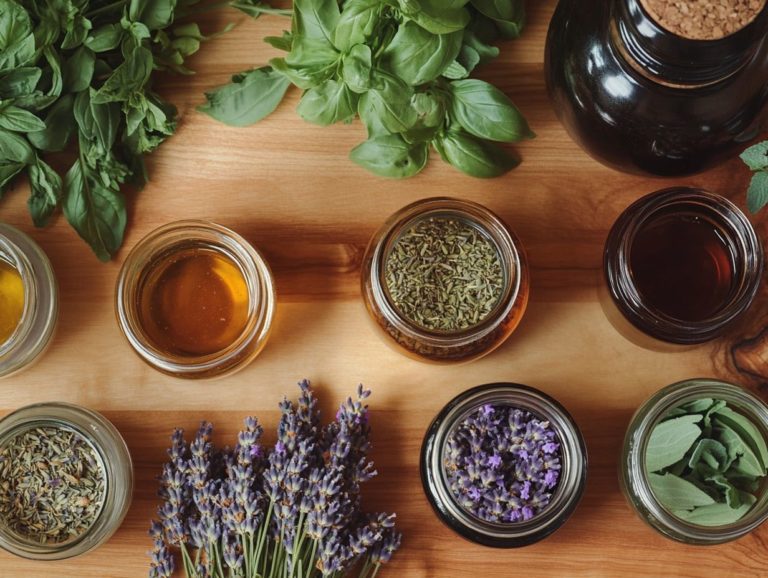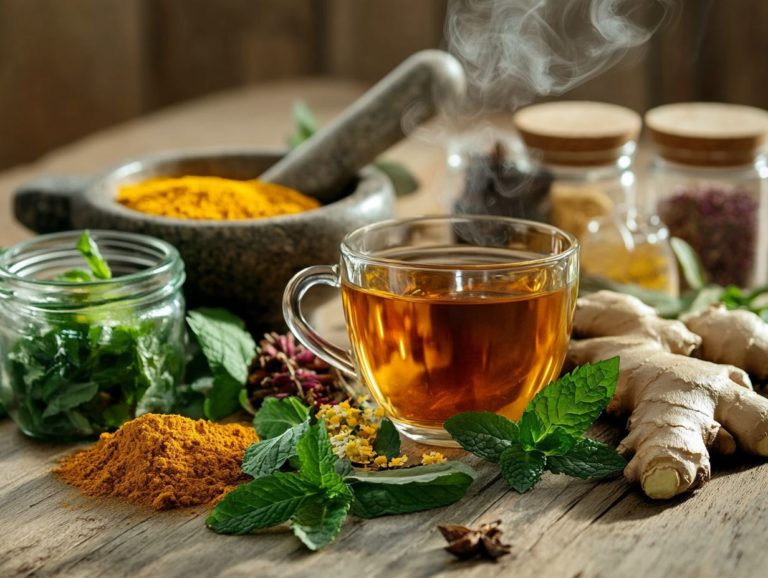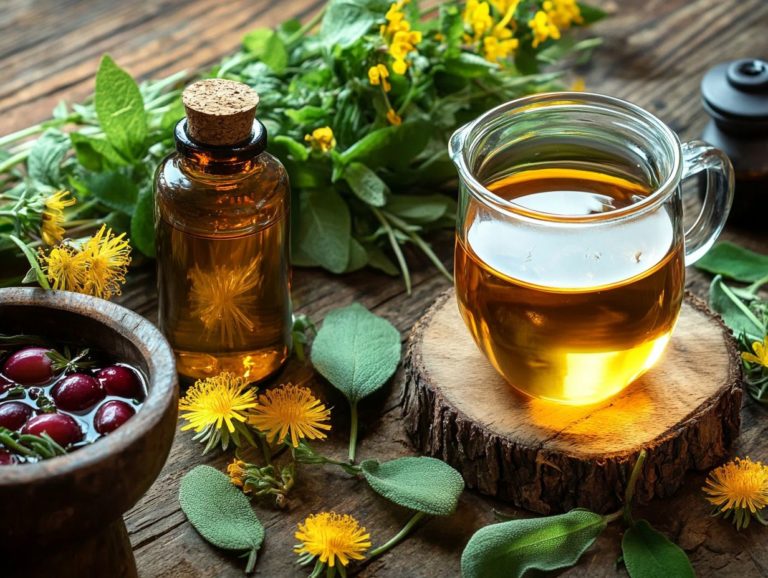Herbs for Treating Fatigue and Exhaustion
Fatigue and exhaustion can be overwhelming. They significantly impact your daily life and overall well-being.
Recognizing the underlying causes and symptoms is vital for your recovery path. This article explores herbal remedies that boost energy and fight fatigue, guiding you on how to safely incorporate them into your routine.
Important lifestyle changes, including exercise and nutrition, can also help you reclaim your vitality.
Uncover natural solutions and embrace a more energized version of yourself today!
Contents
- Key Takeaways:
- Understanding Fatigue and Exhaustion
- Herbal Remedies for Fatigue and Exhaustion
- How to Use Herbs for Treating Fatigue and Exhaustion
- Safety and Side Effects of Herbal Remedies
- Lifestyle Changes for Managing Fatigue and Exhaustion
- Frequently Asked Questions
- What are the best herbs for treating fatigue and exhaustion?
- Do herbs really help with fatigue and exhaustion?
- Are there any potential side effects of using herbs for treating fatigue and exhaustion?
- How should I take herbs for treating fatigue and exhaustion?
- Are there any lifestyle changes that can complement the use of herbs for treating fatigue and exhaustion?
- Can everyone use herbs for treating fatigue and exhaustion?
Key Takeaways:

- Consistent fatigue and exhaustion can be caused by factors like lack of sleep, nutrient deficiencies, and stress.
- Certain herbs, such as ashwagandha and ginseng, can effectively boost energy levels and reduce fatigue without the side effects of caffeine.
- When using herbs, follow recommended dosages and methods. Lifestyle changes, like exercise and stress management, can also greatly improve energy levels.
Understanding Fatigue and Exhaustion
Fatigue and exhaustion are more than simple weariness; they are complex conditions affecting many individuals. These issues often stem from various causes, including chronic fatigue syndrome, adrenal fatigue, and nutrient deficiencies.
These factors can diminish your thinking skills and overall well-being, ultimately lowering your quality of life. Understanding the causes and symptoms of fatigue is key to effective management and recovery.
Recognizing the nuances of sleep disorders is also crucial for anyone looking to regain their energy levels.
Causes and Symptoms
The causes of fatigue and exhaustion vary widely. They include conditions like chronic fatigue syndrome, adrenal fatigue, sleep disorders, and nutrient deficiencies, each presenting its own symptoms.
Take chronic fatigue syndrome, for instance. This condition is marked by persistent fatigue that hampers your daily activities and is often accompanied by memory issues and difficulties concentrating. Adrenal fatigue, a somewhat controversial diagnosis, is thought to stem from overworked adrenal glands, leading to tiredness, sleep disturbances, and mood fluctuations. Sleep disorders, such as sleep apnea or insomnia, disrupt your sleep cycle, affecting your focus and decision-making skills.
Recognizing these symptoms can change your life. Implementing effective management strategies ensures that any underlying causes are properly addressed.
Herbal Remedies for Fatigue and Exhaustion
Herbal remedies offer sought-after solutions for fatigue and exhaustion. Using the finest herbs known for their adaptogenic properties can help restore your energy and alleviate fatigue symptoms.
Top Herbs for Boosting Energy and Reducing Fatigue

Several top herbs are renowned for their remarkable ability to boost your energy and reduce fatigue. Among these, you’ll find popular options like Rhodiola rosea, various Ginseng types, Ashwagandha, Maca, Holy basil, and Cordyceps.
Each of these herbs has unique properties designed to rejuvenate both body and mind. For instance, Rhodiola rosea is celebrated for its stress-managing properties that help you combat stress and elevate your stamina. Additionally, herbs for relieving stress-induced tension like Ginseng are praised for their revitalizing effects, enhancing both physical and mental performance.
Ashwagandha supports the reduction of cortisol levels, aiding recovery from fatigue. Maca root is cherished for its hormone-balancing effects that can significantly enhance your vitality. Meanwhile, Holy basil acts as a natural stress reliever, promoting calm while energizing your mind. For those looking to boost their mood and energy, exploring herbs for enhancing mood and energy can be beneficial. Additionally, Cordyceps mushrooms are recognized for boosting cellular energy production, making them a favorite among athletes seeking an edge.
To complement these powerful herbs, consider indulging in peppermint tea. Known for its invigorating properties, it can stimulate alertness and improve concentration, further supporting your journey to reclaim your energy. You may also wonder if herbal remedies help with chronic fatigue.
How to Use Herbs for Treating Fatigue and Exhaustion
When using herbs to combat fatigue and exhaustion, it’s important to understand the right methods of consumption and dosage. This knowledge allows you to tap into their natural energy-boosting properties, ensuring that the herbal supplements you choose are both safe and beneficial.
Methods of Consumption and Dosage
When consuming herbal supplements, understanding the various forms and recommended dosages is crucial for maximizing their natural energy benefits.
You can take herbal supplements in several ways, including soothing teas, potent powders, or convenient capsules. Each method has unique perks, whether it s the calming ritual of brewing tea or the simplicity of popping a capsule on the go.
The right dosage depends on the herb and your individual factors, like body weight, overall health, and sensitivity. It’s wise to look into recommended dosages or consult with a healthcare provider, especially when you re starting a new regimen.
Always remember potential interactions with other medications and be aware of any allergies. This awareness ensures your herbal experience is both safe and effective.
Safety and Side Effects of Herbal Remedies
Many people consider herbal remedies safe, but it’s essential to understand the potential risks and precautions tied to their use. This is especially important when it comes to herbal supplements and the possible drawbacks of mixing them with caffeine or other substances.
Being informed can help you make choices that enhance your well-being.
Possible Risks and Precautions

It’s crucial to understand the potential risks that come with using herbal supplements, including interactions with other medications and caffeine-related drawbacks that might worsen fatigue symptoms for some.
Certain herbal remedies can cause adverse effects, such as gastrointestinal discomfort or allergic reactions, particularly if you have preexisting health conditions. For example, while St. John’s Wort may boost your mood, it also carries the risk of diminishing the effectiveness of prescription antidepressants. Likewise, supplements like ginkgo biloba could interfere with blood thinners, potentially leading to complications.
Given these varied and often unpredictable responses, consulting with healthcare professionals is paramount. They can provide personalized advice, guiding you through the landscape of herbal supplements safely, while considering your unique health profile.
Start exploring these powerful herbs today and take charge of your energy levels!
Lifestyle Changes for Managing Fatigue and Exhaustion
Along with exploring herbal remedies, you may find that making lifestyle changes can dramatically boost your energy levels. Incorporating regular exercise, enhancing your nutrition, and managing stress effectively can be especially beneficial, particularly for those facing adrenal fatigue and related mental performance challenges.
Embracing these adjustments can foster a more vibrant and energized you.
Incorporating Exercise, Nutrition, and Stress Management
Incorporating exercise, nutrition, and effective stress management techniques is essential for combating fatigue and enhancing your overall mental performance, especially when facing adrenal fatigue.
Engaging in low to moderate-intensity exercises think walking, yoga, or swimming can significantly elevate your energy levels while also boosting your mood and resilience. Pairing this physical activity with a balanced diet rich in whole foods like fruits, vegetables, lean proteins, and healthy fats is crucial for restoring your vitality and supporting those vital metabolic processes.
Mindfulness practices like deep breathing exercises, meditation, or journaling can help alleviate stress and promote mental clarity. When you weave these practices together, you’re not only tackling the symptoms of fatigue; you’re also laying the foundation for a more holistic treatment plan that nurtures your long-term well-being.
Frequently Asked Questions
What are the best herbs for treating fatigue and exhaustion?

Some of the best herbs for treating fatigue and exhaustion include ginseng, ashwagandha, rhodiola, and schisandra. These herbs help the body cope with stress and fatigue.
Do herbs really help with fatigue and exhaustion?
Yes, herbs can be very effective in treating fatigue and exhaustion. They contain natural compounds that can boost energy levels, improve mental clarity, and balance the body’s stress response.
Are there any potential side effects of using herbs for treating fatigue and exhaustion?
While herbs are generally safe and well-tolerated, it’s important to consult with a healthcare professional before using any new herb or supplement. Some herbs may interact with medications or have potential side effects, so it’s best to seek guidance from a trained professional.
How should I take herbs for treating fatigue and exhaustion?
You can take herbs in various forms, such as capsules, teas, tinctures, or powders. It’s important to follow the recommended dosage on the product label or as advised by a healthcare professional. Some herbs may need to be taken consistently for a few weeks to see optimal results.
Are there any lifestyle changes that can complement the use of herbs for treating fatigue and exhaustion?
Yes, making lifestyle changes such as getting enough sleep, maintaining a healthy diet, staying hydrated, and incorporating exercise and stress-relieving activities can all support the effectiveness of herbs in treating fatigue and exhaustion.
Can everyone use herbs for treating fatigue and exhaustion?
While herbs are generally safe for most people, pregnant and breastfeeding women, as well as individuals with certain medical conditions or those taking certain medications, should consult with their healthcare provider before using herbs for treating fatigue and exhaustion.
Don’t wait to feel better! Start making these changes today and consult with a healthcare provider for personalized advice.






